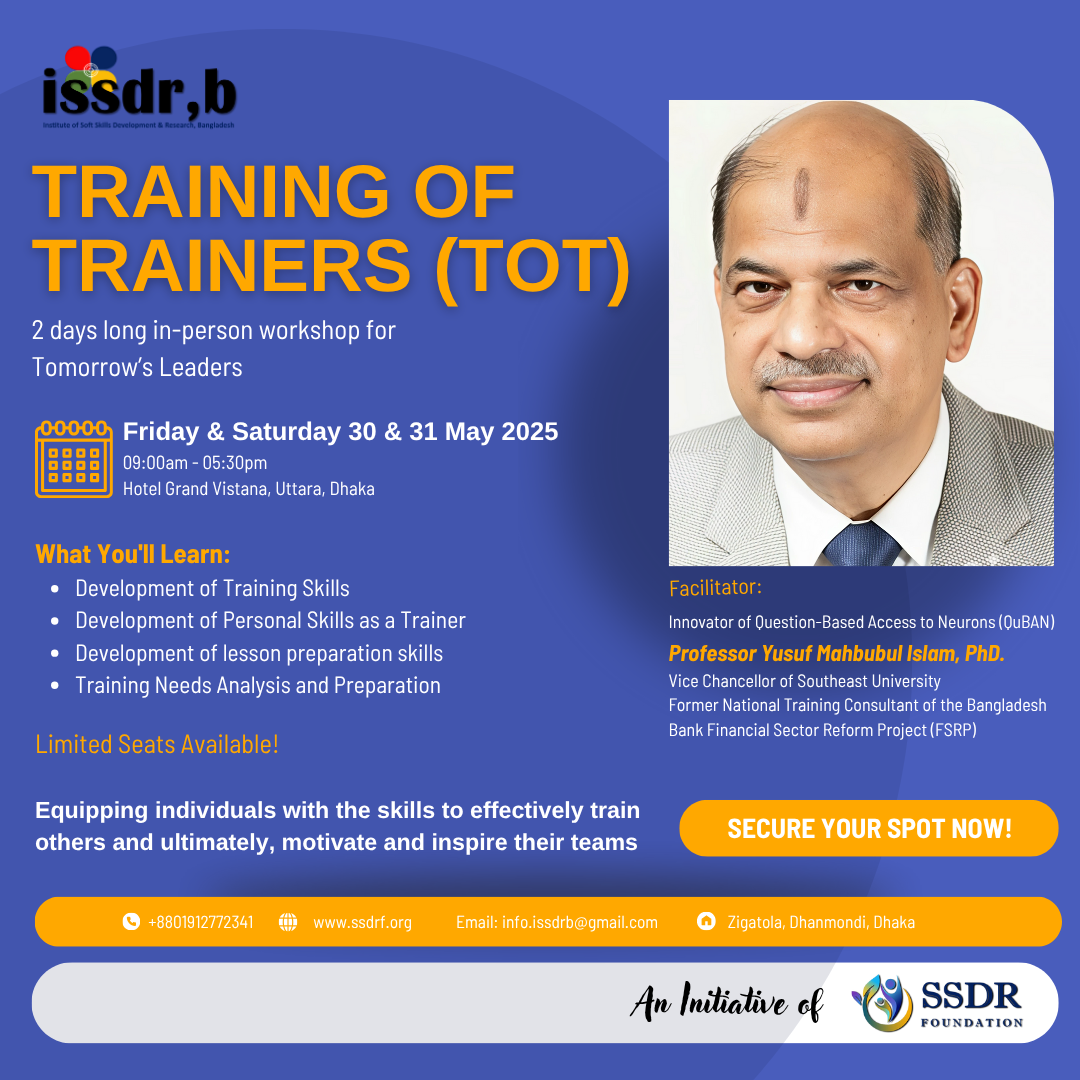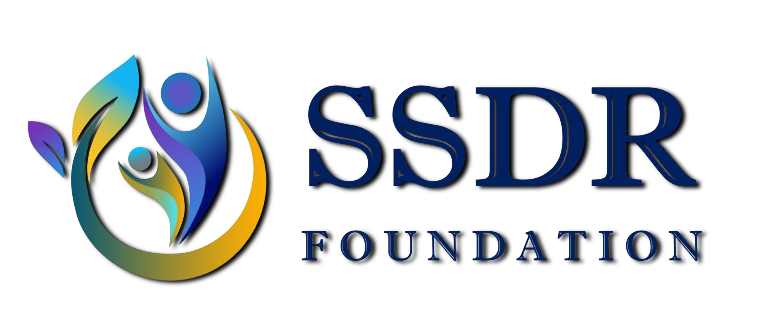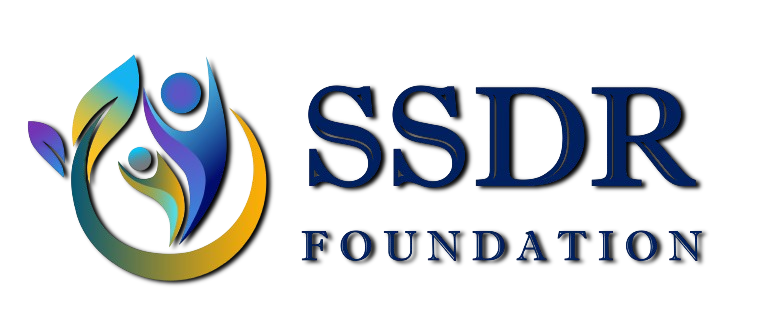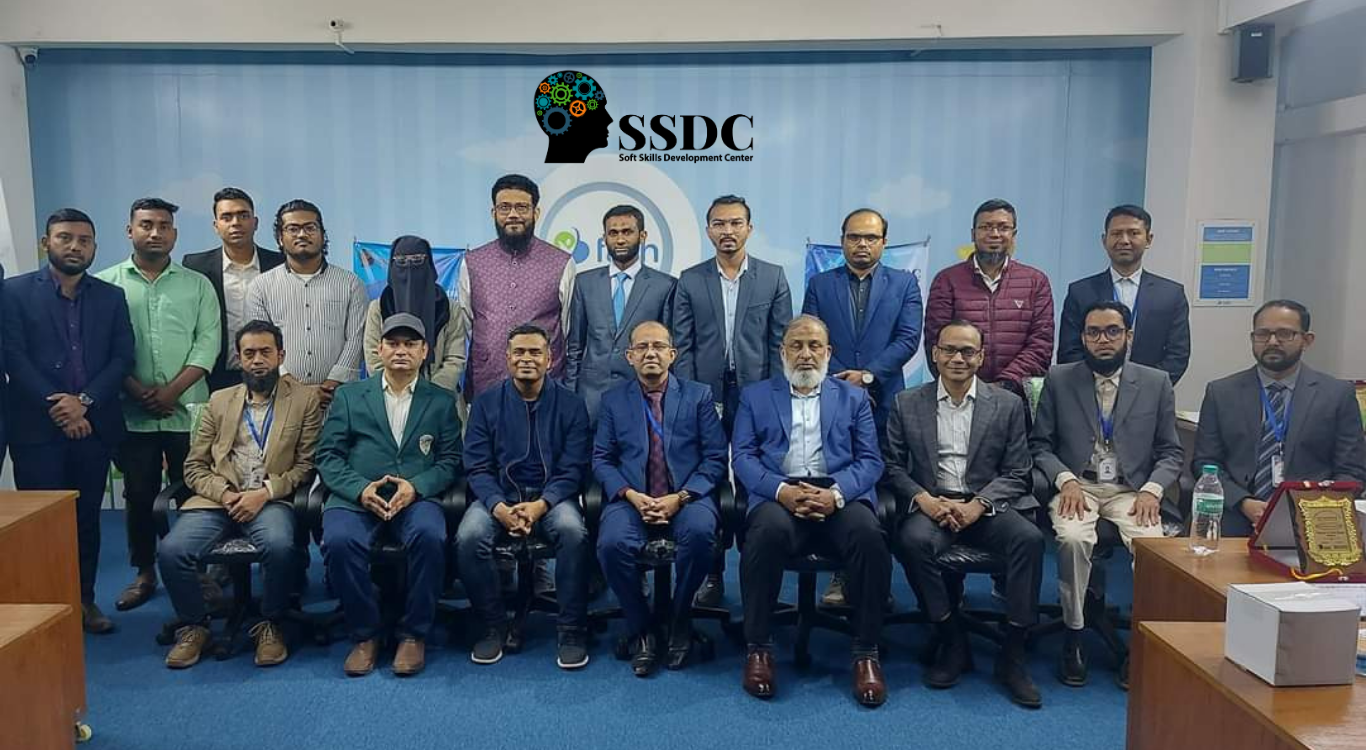Introduction:
A trainer is a person who instructs learners and makes them capable of behaving in a better way. To do this trainers not only deliver information but also foster a productive learning environment that supports continued skill development. As such to do this, a trainer should have excellent organizational, interpersonal, and communication skills, along with the ability to find skill gaps in the learners
Institute of Soft Skills Development and Research, Bangladesh (issdr,b) designed the “Training of Trainers” (ToT) workshop to equip participants with the necessary skills and knowledge to effectively design, deliver, and evaluate training programs.
This ToT workshop is designed to assist in motivating participants to learn a variety of delivery forms that can be adopted to engage students with course content effectively.
Registration Fee : BDT 6200 per participant (Excluding all vat and tax)
Venue : Uttara
Date: 30 and 31, May-2025
(Special Discount will be applicable for Group participants)
Registration Link: https://forms.gle/sPpBUf6KYNxckJhx7
Purpose:
The purpose of the specially designed ToT workshop is to build capacity of managers, teachers, organization’s leaders
Key objectives:
- Ensure trainers understand how adults learn and apply these principles to enhance training effectiveness.
- Enable trainers to design and deliver structured and outcome-oriented training programs.
- Equip trainers with effective communication techniques to engage and inspire learners.
- Familiarize trainers with various tools and technologies used in modern training environments.
- Equip trainers with the skills to assess the effectiveness of their training sessions.
Training Duration:
- Workshop for Training Need Assessment: 2Hours (Online)
- Main workshop: 2Days (16 hours), in person
- Workshop for feedback and Outcome Analysis: 2Hours (Online)
Training Method:
The training will be conducted using a participatory methodology. Other techniques like lecture/discussion, question-answer, group discussion, case study, games etc. will also be applied.
Training Policy:
- 2 hours session will be conducted for Training Need Assessment, 3-5 days before the final workshop.
- Attendance on time;
- Being attentive;
- Asking questions to clarify anything unclear;
- Being compassionate to each other;
- Being respectful to others' opinions;
- Not more than one person talking at the same time;
- Participating in all activities;
- Abiding by the rules of the training venue;
- Maintaining friendly relations;
- Keeping mobile phones switched off during discussion;
- Not going out of the training room unless it is an emergency and
- 2 hours session will be conducted for “Feedback and Outcome Analysis” after 1 month of main workshop.
Modules:
"Training of Trainers (ToT)" program equips experienced professionals with the skills to effectively teach and mentor others. Below is a general course module outline, covering essential topics and skills trainers need to master:
|
Part I: Development of Training Skills |
||
|
1. |
Can questions help focus/brainstorm on a topic? |
· Participants will be able to design engaging questions on a topic that will ensure students' interaction.· They will be able to challenge them to become independent creative learners. |
|
2. |
How can participants be engaged to help them learn? |
· Participants will be able to design interactive lessons to ensure students' engagement on a topic. |
|
3. |
Can feedback be built into question design? |
· Participants will be able to design a marking scheme and feedback that would help students gauge their skills. |
|
Part II: Development of Personal Skills aa a Trainer |
||
|
4. |
Interpersonal Skills |
· Figure out the interpersonal skills that they want to develop in themselves.· Learn which attitudes are desirable/unwanted in a situation.· Learn how to interact and communicate with others. |
|
5. |
Self-Development Plan |
· Measure their own interpersonal skills level.· Design a plan to mitigate the skill gaps. |
|
6. |
Personal Skills |
· Figure out the personal skills they need to work on to become successful in life.· Set personal goals for improving their skills. |
|
7. |
Application of personal skills |
· Gain knowledge about self-management and independent learning.· Know why it is necessary to show a positive attitude even when the situation is unfavorable. |
|
8. |
Time management |
· Learn to break down a task with timestamps and monitor each task.· Learn to make Gantt charts. |
|
9. |
Comprehension |
· Know the purpose of reading.· Learn how to read and understand an articles |

|
Part III: Development of lesson preparation skills |
||
|
10 |
Use of Interactive software to deliver lessons |
|
|
11 |
Use of PowerPoint |
|
|
12 |
Use of Excel to develop case studies and statistical analysis |
|
|
Part IV: Training Needs Analysis and Preparation |
||
|
13 |
Planning the lesson |
· Assessing the needs of the participants· Putting lessons together, · Tailoring the materials for the audience,· Use technology to organize the lessons |
|
14 |
Organizing Learning Activities in class |
· Pair work· Group work· Presentation· Peer Evaluation· Discussion Sessions |
|
15 |
Reflections on lessons learned and Implementation Plans |
· Design own course plan· Presentation of the plan· Modification based on input from the trainer |
|
16 |
Feedback and Certification |
· Feedback on the training received· Evaluation of the trainers· Presentation of certificates |




